 England v Trinidad, France v Togo – former imperial powers playing ex-colonies is a special World Cup theme. Phil Town reports on reaction in Lisbon to a similar game
England v Trinidad, France v Togo – former imperial powers playing ex-colonies is a special World Cup theme. Phil Town reports on reaction in Lisbon to a similar game
Portugal and Angola have met just twice on the football pitch, both trouncings that went Portugal’s way: in 1989 they won 6-0, in 2001 5-1. But if you wanted evidence of the much longer links between the two countries you need only look at the latter game, and the whiff of a colonial war about it.
“I appeal to the fans, both Portuguese and Angolan, to make this a festa,” Portuguese Football Federation president Gilberto Madaíl had pleaded in the programme notes for the game. While at the beginning the fans were up for the idea, the Angolan players appeared to have taken not the slightest bit of notice. By half-time, three had been sent off.
Within the hour, a sinister game plan began to take shape, Angola rushing on all the substitutions they could make. On 65 minutes, another Angolan was sent off. Down to seven, it only needed Hélder Vicente to fall as if poleaxed on 70 minutes, with no substitutes to take his place, to have the game abandoned.
Initially happy Angolans, making up three-quarters of the meagre 10,000 dotted around the old Alvalade stadium (Sporting’s Lisbon home), had long since ceased to fazer a festa and by the half-hour mark had chosen instead to rip out seats and throw them on to the running track, then to abandon the stadium and cause mayhem in the surrounding streets. The Angola coach at the time, Mário Calado, was highly critical of the French referee, but could not in all honesty defend his own or his players’ attitude on the night.
Now, with the sides drawn against each other in the World Cup after Angola qualified for the first time, it falls to coach Luís de Oliveira Gonçalves to smooth things over: “At the World Cup, the two national teams have an obligation to leave a good image. Portugal and Angola are almost family, with very strong ties.”
The war for Angola’s independence, in the Sixties and early Seventies, along with the same movements in Portugal’s other colonies, shook the then regime to its eventual demise, culminating in the 25 April Revolution in 1974. Yet while colonisation and the war left both countries with an ambiguous attitude to the other, the overriding feeling, and it is mutual, is that of brotherhood. So when Portuguese football bosses called what is their first game in Group D “the draw we didn’t want”, the sentiment had more to do with the fear of complacency than anything else. Most Portugal players do in fact see Angola as a pushover. The “nowadays there are no easy games” cliche has been trotted out to exhaustion, but Cristiano Ronaldo, Pauleta and Maniche, to name but three, have all called the group (Angola, Iran and Mexico) “accessible”.
On paper, Angola should be nothing to fear. The backbone of the squad is made up of rejects from Portuguese clubs (for example striker Akwá, who passed with little glory through Benfica in the mid-1990s), players from the Portuguese lower divisions (winger Mendonça and 33-year-old playmaker Figueiredo, both at Varzim of the second division), an out-of-work goalkeeper, João Ricardo, and Benfica’s Pedro Mantorras, a centre-forward with a big heart but a right knee held together with bits of sticky tape. However, they beat Nigeria to qualification with six wins, three draws and one defeat, so slouches they cannot be.
Luís Figo struck a sensible note of caution: “It’s a dangerous group. History tells us everything: whenever we’ve had ‘easier’ groups, we’ve had great difficulties.” Coach Luiz Felipe Scolari had a similar warning: “It’s good to remember that four years ago the euphoria turned into a nightmare. We don’t want to go through that again.” In 2002, Portugal had a theoretically “accessible” group in the United States, Poland and South Korea, then fell at the first fence.
Defeat to the USA in the opening game was the trampoline to disaster. Journalist Ferreira Fernandes, writing in the daily Correio da Manhã, hit the nail on the head for the opener this time around: “Angola are the Hungary of Puskas; we’ve got six months to get that into our heads.”
From WSC 228 February 2006. What was happening this month